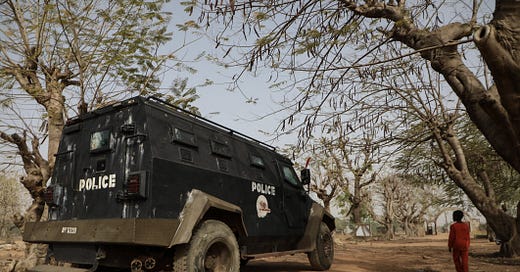Justice is an urban affair in Nigeria’s insecure north
In the north-central state of Niger, lawyers and magistrates say that they are being asked to choose between life and rural court users. They choose life.
Justina Asishana in Minna, Niger State

Last year, on the instructions of a senior colleague, James Jiya travelled 500km to represent a client. But he only appeared once in the court, before abandoning the client.
After that first appearance in Birnin Gwari, a town at the border between Kebbi and Niger states, Jiya was on his way to the bus terminal for the sevenhour journey back to the state capital when he saw a bullet-riddled car. “It had blood stains inside, and I heard the people who towed it say the driver was killed in an attack. I did not conclude that case. I had to abandon it.”
Insecurity in Niger state, where more than 1,270 people were reported killed by armed attackers between January 2022 and July 2023, according to collated press reports, has contracted public life to the areas in and around Minna.
That increasingly includes the court system. Some justice workers continue to work in the rural parts of the state despite the insecurity. Magistrates move around, sharing court premises with peers when some areas get too dangerous, said Ahmad Abubakar Nami, the spokesperson of the Niger state government.
The former magistrate recalls that in 2022, bandits killed a man near a court he was presiding in. “Those in the court were scared, but I told them we cannot end the session. We could only shorten it.”
Such courage can cost everything. In April 2023, bandits abducted Mallam Muhammad Namaru, a registrar, from the court premises in Ibbi. They later killed him.
Living on edge is not for everyone. The insecurity leaves many rural residents without legal representation when needed, as lawyers and magistrates refuse to work outside Minna.
Mikail Usman said he would have abandoned a client last year had they been unsuccessful in applying to transfer his case from Kuta, Shiroro, to Minna. “I told him I would not put my life under such risk.” The day he applied for the transfer, Usman had hidden off the road for a fear-filled 30 minutes amid reports of a bandit attack.
Sometimes, the courts have to be abandoned. The chief judge of Niger state said last year that insecurity had forced her team to close 15 courts.
The day he applied for the transfer, Usman had hid off the road for a fear-filled 30 minutes amid reports of an attack.
Yet moving cases to Minna brings its challenges. Rural litigants, witnesses and police officers are then expected to risk the precarious and expensive journey to and from Minna for each court sitting. They often abandon the cases instead.
Yunusa Umar, who went to court with a land dispute last year, now swears he will not turn to formal justice again as long as he still lives in Munya, 95km out of Minna. “I had to go to Minna for each court sitting. There are courts here, but magistrates are not willing to sit due to the security situation.”



